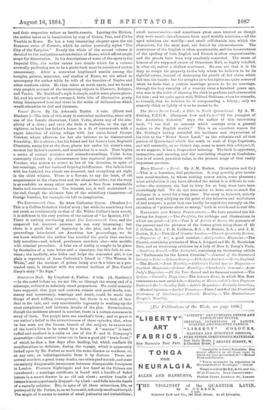Otterstone Hall. By Urquhart A. Forbes. 2 vols. (A. Gardner.)
—In the novel before us, we see life, as through the wrong end of a telescope, reduced to infinitely small proportions. We could scarcely have supposed that joys and sorrows, crimes and good deeds, con- stancy and inconstancy, marriage and death, could be made into things of such trifling consequence; but there is no lack of inci- dent in the tale, and very considerable ingenuity in working-up the most complicated and intricate details of the plot. Neverthelesss, though the incidents abound in number, there is a certain sameness in many of them. Ten people save one another's lives ; and so great is our author's belief in the attractiveness of these episodes, that, when he has worn out the human branch of the subject, he causes one of the hero's lives to be saved by a locket. A " maniac " is hand- cuffed and confined in a cabin on one of the P. and 0. Company's steamships—this maniac turns out to have a good old " brain fever," of which he dies a few days after landing, but which confines its manifestations to delirium, daring the voyage, which is apparently looked upon by Mr. Forbes as much the same disease as madness, or, at any rate, as indistinguishable from it by doctors. There are several murders, a great many deaths, one attempted suicide, and some excessively disagreeable intercourse between disreputable foreigners in London. Florence Nightingale and her band at the Crimea are introduced ; a marriage certificate is found with a bundle of faded letters in a secret drawer in an old oak chest ; another bundle of letters is most opportunely dropped—by a lord —and falls into the hands of a rascally solicitor. Bat, in spite of all these attractions, life, as portrayed by Mr. Forbes, is, as we have said, infinitely small and insipid. The staple of it seems to consist of small jealousies and irritabilities ;
small inconstancies—and sometimes great ones treated as though they were small—interferences from aged worldly relations,—all the aged relations are worldly—and small self-denials into which the characters, for the most part, are forced by circumstances. The correctness of the English is often questionable, and the incorrectness of the spelling of both English and French is often unquestionable, and the proofs have been very carelessly corrected. The sense of honour of the supposed owner of Otterstone Hall, so highly extolled, is, after all, rather a shallow sentiment. He can see that it is his duty to resign his property to the lady whom he believes to be its rightful owner, instead of destroying the proofs of her claim which fall into his hands ; but his scruples as to his rights are quite removed when he finds that a certain marriage proves to be no marriage, through the lazy rascality of a country vicar a hundred years ago, who was in the habit of allowing his clerk to perform such ceremonies for him ; and we quite agree with Wilfred Oakburn, when he remarks, to himself, that he believes he is compounding a felony ; only we scarcely think as lightly of it as he seems to do.


































 Previous page
Previous page